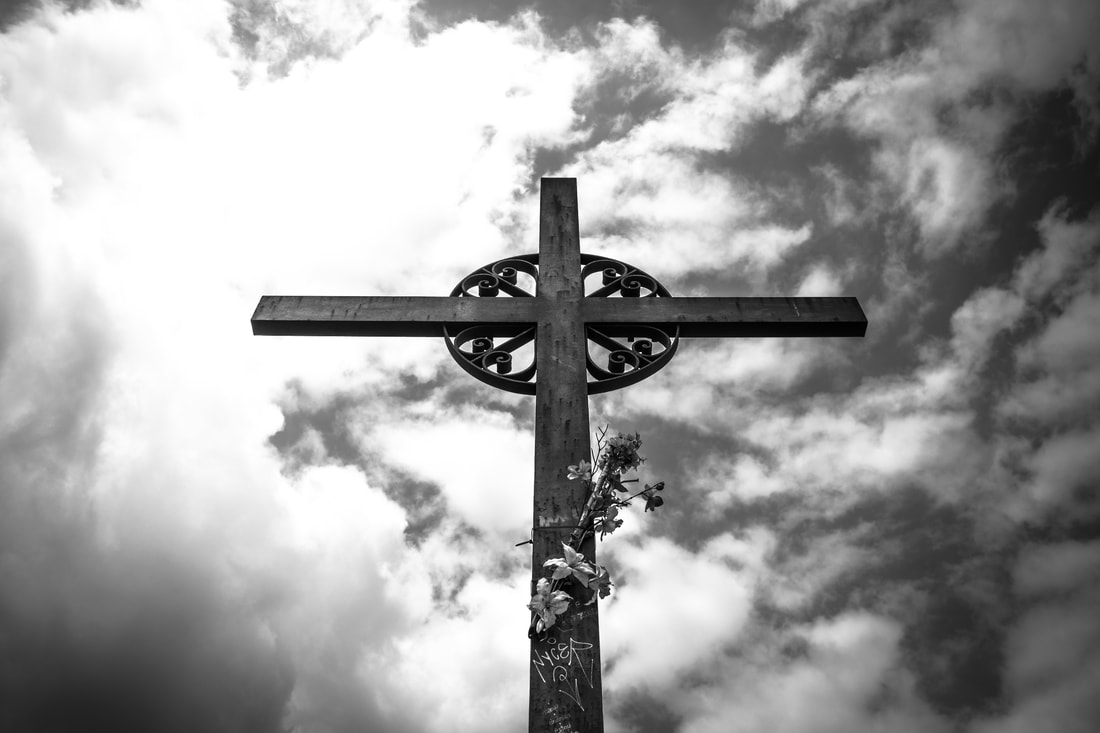The New Testament takes communion very seriously as well. In fact, it is so serious that Paul viewed it as a life and death matter. In I Corinthians 11 Paul declares that some people have “fallen asleep,” (i.e. died) because they participated unworthily in communion. While most pastors don’t go around scaring people away from taking communion with the threat of death, most churches do remind partakers that the matter is considered a very serious one. In light of this, participants are often reminded and encouraged to examine themselves before God and repent of sins prior to taking communion. I think this is a great practice and a somber reminder to reflect on our lives and the work of God. However, it seems quite apparent that this concept of general reflection and general repentance misses much of the weight of Paul’s admonishment.
|
Photo from scop.io by Jose González Buenaposada Communion is an extremely important event for Christians, or at least it should be. Jesus tells us that it’s something we ought to do in remembrance of him, and many faith traditions believe that there is a very real, but mystical means of grace which is manifested in the meal. Our church, and many other churches in our denomination, partake of communion weekly, as we strongly value the mystical bond of communion, not only in its binding of us to Christ, but in the way it binds the community together.
The New Testament takes communion very seriously as well. In fact, it is so serious that Paul viewed it as a life and death matter. In I Corinthians 11 Paul declares that some people have “fallen asleep,” (i.e. died) because they participated unworthily in communion. While most pastors don’t go around scaring people away from taking communion with the threat of death, most churches do remind partakers that the matter is considered a very serious one. In light of this, participants are often reminded and encouraged to examine themselves before God and repent of sins prior to taking communion. I think this is a great practice and a somber reminder to reflect on our lives and the work of God. However, it seems quite apparent that this concept of general reflection and general repentance misses much of the weight of Paul’s admonishment.
0 Comments
Bludgeoning with Peace and Purity
When news came out about Ravi Zacharias and his sexual predation, I was devastated, but not surprised. It's always heartbreaking to find out that someone you hold in high esteem is guilty of heinous evil, but history, experience, and my Christian worldview move me to expect that such things will occur. As Dr. Clay Jones says, these things aren't inhuman, they're what humans do. The state of humanity is not rainbows and butterflies, it's sin and wickedness. Without transformation and a community of accountability, sin has a tendency to work itself out to its final, hideous form of exploitation and destruction. There are two things I particularly love about Reformed theology: its ability to drive one towards humility, and its emphasis on upholding the importance of doctrine. First, Reformed theology is perfectly equipped to drive one to humility through its doctrine - doctrine which demands introspection. The Reformed are well known for using the saying, "There but for the grace of God, go I." Due to the strong doctrine of total depravity, God's grace, and an understanding that our hearts are wicked and deceitful, Reformed believers have no grounds to be shocked when the most godly leader in the world falls, and no grounds to think that anyone is above any sin, even and especially oneself. There is a fear and trembling that Reformed doctrines should produce in our daily living, as well as a converse wonder and awe at the beautiful and extravagant grace of God. Reformed doctrines ought to drive us to humility..
Second, Reformed doctrines are equipped to drive us towards holding doctrine in high esteem. If humanity's problem is a looking to self and a forcing of God into the dark recesses of one's heart and mind, then the knowledge - the true and accurate knowledge of God and his son Jesus Christ, revealed in the Word, through the Spirit, ought to be core to our conversion and continued sanctification. Reformed faith should drive us to seek the knowledge of God in our theology, because right theology ought to cause us to become more and more conformed to the image of Jesus, who is the perfect image of God. There are quite a few people in my circles who aren’t too fond of all the demonstrations which have been going on. In their minds, all demonstrations related to racial issues are "riots," and all of the demonstrations are lead by leftist, Marxist, communist, anarchists. Many of the same criticisms conservatives once levied against the abolitionist or Civil Rights leaders of old are being reused against those claiming to fight racial injustice today. It’s certainly possible that the movement today is of a different character than it was the last several times movements arose in the face of racial upheaval. But it’s also possible that we conservatives who have always sought to conserve the status quo and our power have the same modus operandi today as we’ve always had. It's possible that we are denying injustice in order to preserve our position, just as we've always done. Time will tell, I suppose, as hindsight will eventually make current events more clear. But until then, I think it's important to have a good dose of honest and difficult self-reflection.
While I don’t know whether or not my conservative community is wrong in its majority assessment of the current events, I do want to speak into my community and highlight an inconsistency which I find rather bothersome. One of the most used arguments I see from Christians against the current social movement is that to join one's voice in the outcry is to jettison, forego, or downplay the gospel. To join the movement decrying injustice and calling for societal change is to embrace the social gospel. To join the movement is to declare that the gospel is not enough. What the world really needs is not social change or the social gospel. What the world really needs right now is the pure gospel of Jesus Christ, because it is only the gospel which transforms hearts. The argument here is that the eternal is more important than the temporal, and that if you get your eternal priorities straight, a change of your heart and spiritual focus will change your actions. If you accept the gospel of Christ you will also change your actions. If we just get everyone saved, racism will diminish. It is the gospel which changes society, not social movements, so we ought to spend our time accordingly. In all the turmoil, disagreement, and tension I see amongst Christians today, two words keep coming to my mind: obligation and preference. These two ideas are ultimately what most of our issues seem to boil down to. One group of Christians views some issue as a moral obligation, while the other group views the same issue as a moral preference. Should we take down the confederate flag in consideration of others, or should others respect our freedom to interpret and use symbols as we desire? Should we support an evil political party and/or candidate in order to accomplish a greater good, or are we able to abstain from the system? Should we tear down statues which represent great oppression to many, or should those opposed accept the good and ignore the evil in our monuments, realizing that all heroes are flawed? Should we wear masks out in public in an attempt to protect others from a virus, or should others recognize that the rescinding of freedoms for safety is a more dangerous ill? The issues are endless, but the crux of the problem is almost always the same. There is a discrepancy in how different groups think about moral obligations towards others versus personal freedoms we should be able to pursue and enjoy if we so choose.
This very dichotomy came up a few weeks ago when I had an interesting conversation about race with a few guys from church. I respect these guys very much, though we definitely disagree on various racial and political issues. As we got to talking about race, one of the men said, "I don't think there's anything wrong with white people going to a white church and black people going to a black church. We all have different preferences in music and worship style, so why would we try to force something that's going to create a church style which nobody will be happy with?" While I intuitively disagreed with the argument, I didn't at that time know how to push back. The individual viewed church diversity as a preference, whereas it seemed more akin to a moral obligation to me. After a few weeks of thought, the following is what I wish I would have been able to explore in our conversation. Individualism is one of the great emphases of modern American culture. The value of expression, of individual value, and of individual responsibility is, in my opinion, of utmost importance and meaning. Emphasis on the individual is one of the major aspects which helps to build in Americans that characteristic tenacity, resolve, and ingenuity for which we are known. But for as worn out as the old adage is, one’s greatest strength tends to also be one’s greatest weakness.
Photo by Mariano Castro on Scopio “The Politics of Jesus” has been one of the most influential books in my life. While I could glean ten different life lessons from it to discuss right now, one in particular has surfaced in my mind as of late. In the book, John Howard Yoder, the author, points out several aspects of what it means to bear our cross. Two of these observations had never crossed my mind before. First, Yoder tells us that bearing our cross is not a random event or hardship in our lives, like cancer or a difficult boss. Instead, cross is what is borne as a direct result of the lives we lead as lived in Christ, like moving to a leper colony to serve and contracting leprosy or having your boss fire you for refusing to alter information in a report. Cross is first and foremost something borne as a direct result of living a life directed towards Calvary.
I understand that stereotyping can be bad, in a sense. It is dehumanizing and disrespectful to attribute ills or deficiencies simply because someone is part of a particular group, without getting to know the individual. But in another sense, why should naturalism concern itself with denouncing stereotypes? In fact, naturalism should be encouraging them, as I plan on showing in the following paragraphs.
|
*The views and ideas on this site are in no way affiliated with any organization, business, or individuals we are a part of or work with. They're also not theological certainties. They're simply thinking out loud, on issues and difficulties as I process things.
Categories
All
|











 RSS Feed
RSS Feed